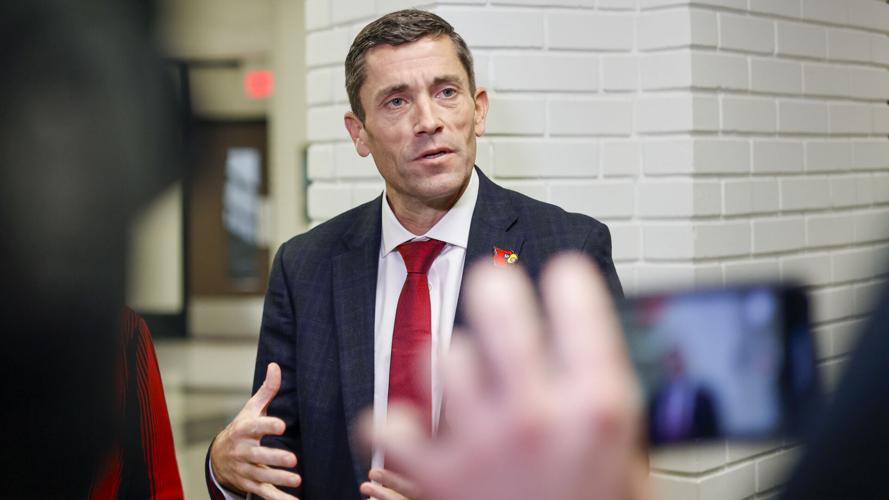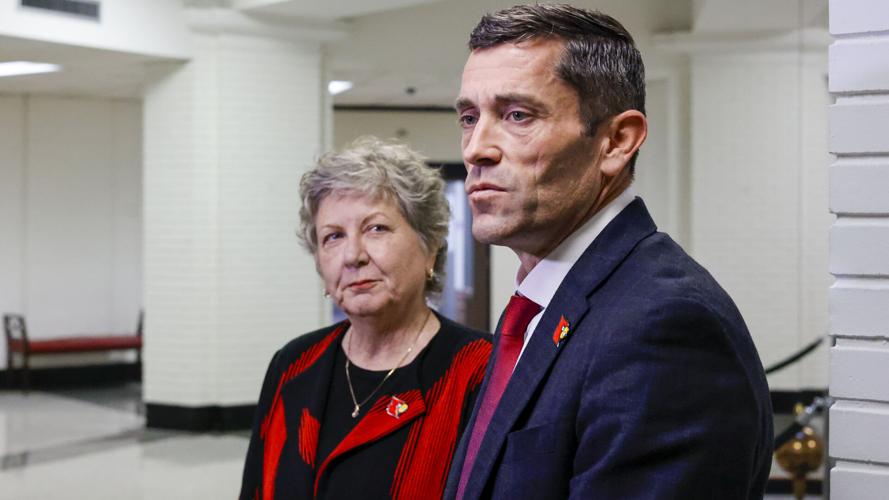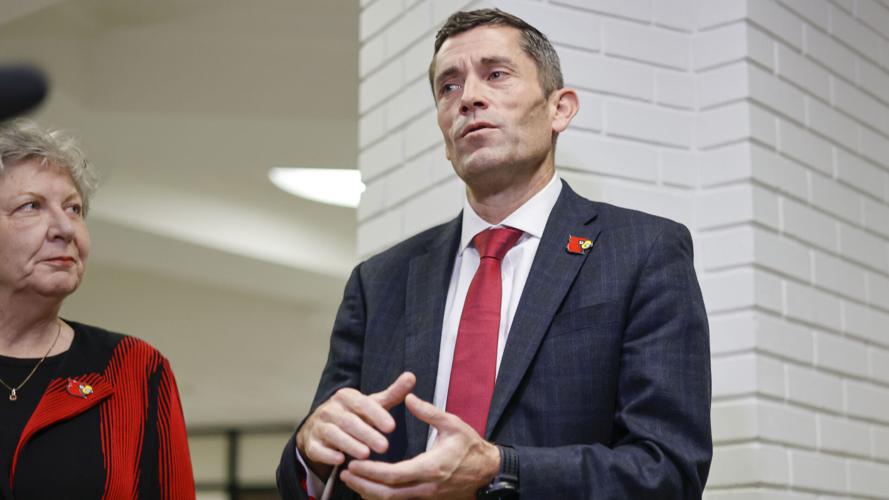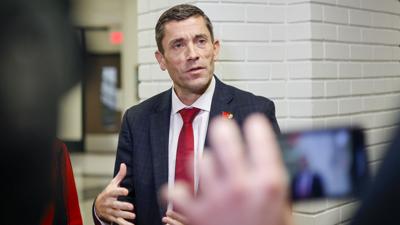LOUISVILLE, Ky. (WDRB) – The University of Louisville board of trustees voted to extend the contract of athletic director Josh Heird by three years on Thursday, through the 2030 academic year.
It was less about giving him a raise (he did receive $75,000 in what was termed “supplemental pay” and a new car benefit, though no increase to his $850,000 base salary). There were no open suitors for his services, though that possibility is always there.
What this was about, according to university president Kim Schatzel, was a “signal of the confidence we have in his great leadership” after three years on the job.
“He's just a tremendous leader, and we're really, really pleased to be able to provide for this extension, to be able to signal how much his leadership means to this institution and to the Department of Athletics, and how important it is for us,” Schatzel said.
But – and this is only my opinion – the move also came now for another reason. It’s a message that in a time when athletics directors all over the nation are going to have to make some difficult and perhaps at times unpopular decisions within the new college sports landscape, Heird is Louisville’s guy, and has the university’s backing.

Josh Heird, with university president Kim Schatzel, speaks with reporters after University of Louisville trustees approved a contract extension that will keep him in the position of athletics director through the 2030 season.
Nobody really knows what is coming as the House settlement is implemented and schools find themselves on the hook for up to $22 million in revenue sharing with their athletes (and perhaps more in additional scholarships they can make available in the highest revenue sports).
Being an athletic director might not be all fun and games in the coming year. Nobody wants to cut sports, but some sports may be fundamentally changed in the new financial reality.
I’m not predicting what will happen at Louisville or anywhere else, but it doesn’t take much foresight to know that change is coming.
“We think about it every day,” Heird said. “I know we discuss it internally in our department every day. And as I've said, this is over the next -- I don't know, I guess I'd probably call it six to 18 months -- it'll be, in my mind, the most transformative time in the college athletics industry. And we just have to try to be as prepared as we possibly can be for it, and make sure that we're ready for what we think is going to come. We don't know that for certain, but we're going to game plan for various scenarios and try to put the university in the best position possible to be successful.”
Most people look at the athletic director’s job as primarily two things – hiring football coaches, and hiring men’s basketball coaches. Heird is dinged by some fans for the hiring and retaining of Kenny Payne, and even has caught some flack for an injury-hampered start under new coach Pat Kelsey. But Heird also looked at the financial reality and perceived that the age of mega-pay for men’s basketball coaches may be drawing to a close. Kelsey is paid well, but not (yet) on a par with his predecessors. That’s just a fact of life.
And if an AD is going to get the bulk of his public evaluation on coaching hires, football ought to be 75 percent. From that standpoint, he knocked it out of the park in showing the judgement not to offer a perfunctory extension to Scott Satterfield, a decision that eventually opened the door to bringing Jeff Brohm back to Louisville – a decision that already has paid off for the department in many ways.
But if you look at Heird’s job from Schatzel’s view, which is that of an overall university administrator’s position, you want someone who works well with you and the university, you want to someone with contacts in the profession, and you want someone who is willing to make difficult calls in close communication with university leadership. In Heird, she believes she has that.
“He's got a lot of expertise,” Schatzel said. “He knows how to pick up the phone and talk to people -- and people call him to be able to seek his advice. He's a man of high integrity. Given the turbulent nature of collegiate athletics, to have somebody that I can trust and that I can know can bring the right information and can reach out, and we can work together with the board to make the kinds of decisions we might have to or face uncertainty, it's a good thing.”
Heird, at the moment, isn’t talking about making hard decisions. He couches it in the language of making the best calls he can with the resources at his disposal.
For instance, the NCAA no longer institutes scholarship limits, but it does have new roster limits. You can have 105 football players on scholarship. (U of L, sources say, is unlikely to grow much beyond the current 85-scholarship size for football, but it has that option.) Another question, with the bulk of the $22 million in potential revenue sharing going to the most profitable sports – football and men’s basketball – how are others dealt in? Not every school will handle things the same way.

Josh Heird speaks with reporters after University of Louisville trustees approved a contract extension that will keep him in the position of athletics director through the 2030 season, as university president Kim Schatzel looks on.
“I think the decisions are going to be different for everybody,” Heird said. “So, as you're out there, like she said, having those conversations with colleagues around the country, what their mix of revenue and expenses is going to be different than ours. And how do we put that together to optimize what we're trying to achieve here at the University of Louisville? That's what we're going to try to do. It's an ebb and flow. It changes. It's like, hey, we think we want to go down this road, and then we might have to pivot a little bit. I say it all the time, the easiest way to stop being wrong is to change your mind. So, there's probably going to be a few times where we have to change our mind. . . . What you have to do is say, ‘This is what we've been dealt and how do we manage it?’ As opposed to, ‘I don't like it,’ or ‘I don't think this is what we should be doing.’ This is where we are. So how are we going to manage it? That's what we're going to try to do.”
What was behind the Heird extension? Remember, this is my opinion, not what anyone is saying outright. But among other things, what is behind it is sending the message that Heird is in charge where many of these decisions are concerned, and he has the university backing to make them. The $75,000 in supplemental pay doesn’t say it’s compensation for sleepless nights or potential headaches, but perhaps it could.
“When you're looking at the changes in athletics, the national landscape for collegiate athletics,” Schatzel said, “to be able to have somebody who's experienced, who has shown that they can do the work, and to have the kind of track record that he has, as well as the relationships that are built, and in all honesty, also the national reputation in terms of the connections and relationships that he has . . . it’s a good thing.”
Copyright 2024 WDRB Media. All Rights Reserved.














